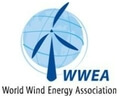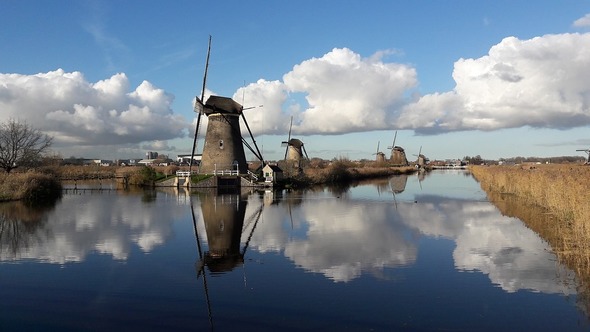News Release from World Wind Energy Association e.V. (WWEA)
Wind Industry Profile of
“Mills to Megawatts: A Journey of Wind Energy across Europe”: A Joint Wind History Archive Project
Bonn, 17 September 2024 (WWEA) – The Mills Archive Trust and the World Wind Energy Association (WWEA) are awarded a €10'000 grant from a Joint Project between the European Union and the Council of Europe. The grant will be used to explore European-wide opportunities to preserve and share the history of wind energy and how innovators have applied the power of the wind to generate electricity.
During the project, ‘Mills to Megawatts: A Journey of Wind Energy across Europe’, an interactive map will be built and shared, connecting countries, sites, individuals and community groups and document the development of wind energy to create an archive of information for future generations. Research will bring together related historical and contemporary sources of knowledge across countries and digital resources on key people, places and inventions will be made publically available.
Eight grants of €10'000 were on offer in a competitive process in which heritage organisations across Europe could apply after submitting European Heritage Days Stories. The call for European Heritage Days communities to submit their heritage stories aims to encourage engagement, belonging and sharing of insights about the European dimension of their work.
The Mills Archive Trust, in collaboration with WWEA and supported by the German Wind Power Museum and the Nordic Folkecenter for Renewable Energy, submitted a story called, ‘Molina Duvent and the Lost Seed of Svalbard’. In this story it is the year 2124 and Europe faces imminent destruction from the climate crisis, causing widespread devastation and loss of life. The collapse of the renewable energy industry exacerbates the situation, widening the gap between the rich and poor and with crucial knowledge being lost. However, a group of diverse experts convenes secretly to devise a plan to confront the crisis. The project funded by the 10'000 Euros grant will also present information as a story, with regular updates from the character of Molina Duvent.
The Mills Archive Trust is a UK-based registered charity and accredited archive that protects, preserves and promotes the history of milling for people to learn from and enjoy. Their coverage is global and includes the two main historical power sources for milling – wind and water - which are attracting more attention in recent years in response to climate change. Since 2021 it has collaborated with the World Wind Energy Association (WWEA), which is an international non-profit association embracing the wind sector worldwide, with more than 600 members in around 100 countries. WWEA works for the promotion and worldwide deployment of wind energy technology. It provides a platform for the communication of all wind energy actors worldwide, advising national governments and international organisations, and enhancing international technology transfer.
Both organisations will also be working closely with energy archives expert and special advisor to the World Wind Energy Association, Kolya Abramsky, who introduced the two organisations in 2021. The team will also work with the German Windpower Museum (Deutsches Windkraftmuseum) and the Nordic Folkecenter for Renewable Energy in Denmark.
Commenting on the award, Trust Director Elizabeth Bartram said: “We are delighted to receive this funding from the European Union and Joint Council of Europe. We are passionate about connecting the past with the present and shedding light on the important developments of renewable energy – in this case wind energy - over centuries. The opportunity to collaborate more closely with the WWEA is exciting, as is the prospect of building more links with groups and communities in other parts of Europe. Cultural heritage is a valuable resource for addressing contemporary challenges and we will champion this throughout the project.”
World Wind Energy Association Secretary General Stefan Gsänger said: “Wind power has become a mainstay of the world's electricity supply and, together with solar energy, will be the primary source of energy. This global importance underlines the need to understand and preserve the roots of modern wind power, whether in Europe or elsewhere. We are privileged to be able to work with professional organisations in this field, such as the Mills Archive, to secure the future by protecting our history. The 'Mills to Megawatts: A Journey of Wind Energy across Europe" is an important step towards our ultimate goal: a global network of wind archives.”
About The Mills Archive Trust
Since 2002, this registered charity (registered with the UK Charity Commission, number 1155828) protects, preserves and promotes the history of milling and its associated power sources, for people to learn about and enjoy. It does this so that the contributions of people past are recognised and celebrated for their roles in feeding, clothing and powering their families, communities and countries through milling. It is the only organisation in the world to do this. An accredited archive service, the Trust received the Queen’s Award for Voluntary Service in 2018 and remains an important provider of education and work-based training.
The Trust cares for 3 million photographs, letters, artworks, diaries, technical drawings and small artefacts, of which almost 100'000 have been added to their online catalogue and can be viewed for free. It also has a library of 10'000 books, magazines and articles. The Trust can be visited by appointment and its records viewed in person, at Watlington House, and it has an information-rich website: https://new.millsarchive.org
Find them on Facebook, Instagram and LinkedIn
About The World Wind Energy Association
Founded in 2001, WWEA is an international non-profit association embracing the wind sector worldwide, with more than 600 members in around 100 countries. WWEA works for the promotion and worldwide deployment of wind energy technology. It provides a platform for the communication of all wind energy actors worldwide, advises national governments and international organisations, and enhances international technology transfer.
Visit their website or social media for more information: https://wwindea.org/
Facebook, Twitter, LinkedIn
About the Nordic Folkecenter for Renewable Energy
Founded in 1983, Nordic Folkecenter for Renewable Energy is a non-profit, independent, organisation. It provides research, development of technology, training and information for the manufacture, industrial innovation and implementation of renewable energy technologies and energy savings in Denmark and throughout the world.
Nordic Folkecenter for Renewable Energy intends to achieve measurable increases in the utilisation of renewable energy technologies and thereby significant reductions in environmental pollution associated with energy use in Denmark and elsewhere. It obtains support from local authorities, national and international agencies, and the industry. The ultimate long-term purpose is a complete replacement of fossil fuels and atomic power with renewable energies.
Read more about Nordic Folkecenter for Renewable Energy on their webpage: https://www.folkecenter.net/
About the Deutsches Windkraftmuseum
The German Wind Power Museum is a non-profit, registered association (eV) and is based on the former Mühlenheider Wind Power Museum, founded in 1997. Their goal is to secure and document the historical roots of modern wind energy use in Germany and other countries and to make them accessible to the public.
Wind turbines from the 1980s and 1990s form the foundation for the current success of wind energy worldwide. Preserving and maintaining these early turbines is the core task of the museum. This also applies to documents from the grassroots movement of the 1970s and gradual industrialization in the 1980s/90s. The museum's current collection of exhibits is unique, both in Europe and globally.
While the majority of exhibits come from German wind power history, the museum‘s commitment is not limited to regions, countries, manufacturers, technical principles or other criteria. The Deutsches Windkraftmuseum is an internationally oriented, open museum and is committed to the decisions of the association's members.
Read more about Deutsches Windkraftmuseum on their webpage: https://deutsches-windkraftmuseum.de/en/
About European Heritage Days
The European Heritage Days are the most widely celebrated participatory cultural event shared by the people of Europe. The Council of Europe launched the initiative in 1985, and in 1999 was joined by the European Union to create the joint action, which has continued up to the present day. Conceivably, the Programme, which can boast up to 20 million visitors every year, generates the greatest value, Euro for Euro, of any “European” cultural project.
Held in September each year, EHD events – often called Heritage Open Days - take place in the countries party to the European Cultural Convention. During this time, doors are opened to numerous monuments and sites, allowing Europe’s citizens to enjoy free visits and learn about their shared cultural heritage and encouraging them to become actively involved in the safeguard and enhancement of this heritage for present and future generations.
The Call for European Heritage Days Stories intends to identify the European Dimension of heritage sites and heritage work undertaken by the communities in Europe. It refers to past or existing stories that communities would like to share and potentially develop into a project to further contribute to their communities. The Call for European Stories was launched as an activity of the European Year of Cultural Heritage 2018, the successes of which it now aims to build on, and supporting the European Framework for Action on Cultural Heritage, adopted in December 2018 to secure the long term impact of the European Year of Cultural Heritage. In the framework of the joint vision of shared European values, the Call is also open to the EU Prize for Cultural Heritage/Europa Nostra Award winners and the European Heritage Label sites.
Website: https://www.europeanheritagedays.com/
To read the introductory story of ‘Molina Duvent and the Lost Seed of Svalbard’, visit: https://www.europeanheritagedays.com/Story/Molina-Duvent-and-the-Lost-Seed-of-Svalbard-0
- Source:
- World Wind Energy Association
- Email:
- secretariat@wwindea.org


